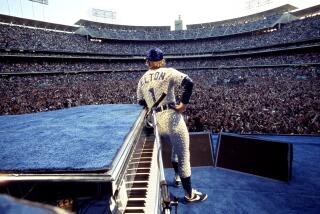Elton Johnâs Tribute Soothing and Intimate
On the long list of lessons in the tragedy and spectacle of Princess Dianaâs death and funeral, there is a reminder of the way pop music can touch and cleanse us.
Given the solemnness of the procession and the service Saturday, the swell of applause when Elton John finished singing âCandle in the Windâ in the cathedral was both startling and comforting for those watching on television.
Even though pop-rock star Johnâs role in the program was one of many signs that the ceremony was a dramatic break with formal, royal tradition, it was hard to imagine that those in the church would break into applause under such intimidating circumstances.
The reaction, it turned out, was from the thousands of mourners who were listening to the funeral on speakers outside Westminster Abbey. After standing passively for hours, the crowd found in the song a chance to use their applause to express actively their love for the woman who was described in âCandleâ as Englandâs âgolden child.â It was their applause that was picked up by television microphones.
The melody to âCandle in the Windâ is so graceful and melancholy that the song would probably have provoked the same reaction even if John had sung the original 1973 words, which referred to the death of Marilyn Monroe.
Some listeners might even have welcomed the bitter sting of the original lines--especially the one that goes âthe press still hounded youâ--because it was in keeping with the anger so widely felt over the way the princess was pursued by the tabloid press.
But Bernie Taupin, Johnâs songwriting partner, wisely refocused the song last week when he wrote some new lyrics for âCandle in the Wind.â More than anger, the message John and Taupin wanted to convey in their eulogy to the princess was love.
His rewording includes the line, âYou called out to our country, and you whispered to those in pain. Now you belong to heaven and the stars spell out your name.â
This version will be recorded and rush-released to stores as a charity single.
There wasnât time for John to rehearse the new version with a choir, so he sang it to his own piano accompaniment--which gave an intimacy that was just what the grand occasion needed. As much as the television cameras, John and his familiar song brought us all into Westminster Abbey. For millions, they served as our stirring and personal ambassadors.
More to Read
The biggest entertainment stories
Get our big stories about Hollywood, film, television, music, arts, culture and more right in your inbox as soon as they publish.
You may occasionally receive promotional content from the Los Angeles Times.










